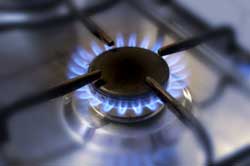
When free of clogs, flames will be blue and even.
The Oven and Stove
Energy (fuel) costs from cooking can run from $50-$100 per year. Over time, a few simple changes can add up to big savings.
Clean the reflectors under the burners to reflect heat more efficiently.
Gas burners should be cleaned on a regular basis to keep food and grease from clogging ports. When free of clogs, flames will be blue and even. A yellow flame suggests the port needs to be cleaned or adjusted. The tip of the flame (hottest part) should reach the bottom of the pan.
Food cooked in ceramic or glass pans and dishes will cook at lower temperatures than those cooked in metal.
Avoid "peeking" into the oven to check on baking progress. Each time you open the door, you lose 25% of the heat.
Turn off burners during the last few minutes of cooking. The remaining heat will be enough to finishing the cooking.
Match the pot to the burner. Heat and energy are lost if the burner is bigger than the size of the pot.
If you're considering a new cook top, induction cook tops are the most efficient users of energy. They use up to 90% of the energy they produce (electric burners use about 65% and gas burners use 55%).
The Refrigerator
Believe it or not, your refrigerator can be the third largest contributor to your total energy bill. When it's time to decide whether to repair an older model, it would be wiser to invest the money into a new, more energy efficient model; you'll see an instant $75-$100 savings on your yearly electric bill. In the meantime, try these tips.
To keep your refrigerator running at peak efficiency, keep the coils on the back and bottom clean and cool. This means routine vacuuming of the condensing coils and keeping them away from external heat sources like stoves, radiators and heat vents. Leave enough space between the coils and the wall for cooling air circulate around the condensing coils.
Give gaskets the dollar bill test. Close the door on one half of a dollar bill. If it pulls out easily when tugging on it, your not getting a good seal and your gaskets may need replacing or adjusting.
Your refrigerator and freezer will perform better if kept relatively full. Make sure food items are spaced a little apart to allow air to circulate around them.
Keep temperature settings between 38ºF and 40º F in the refrigerator, and 5ºF in the freezer (stand alone freezers should be kept at 0ºF).
Keep humidity down by keeping liquids covered and make sure hot foods are allowed time to cool before storing.
The Garbage Disposal
Running cold water while operating your garbage disposal will save energy on water heating. Use hot water only when necessary to wash away small amounts of grease.
The Dishwasher
If your dishwasher has an automatic air-dry setting, turn it off. Letting dishes air dry by opening the door can reduce a dishwasher's energy use by half. Use a good quality dishwasher detergent to prevent spots.
Pre-rinse your dishes (using cold water) before loading the dishwasher and only run when you have a full load. Run you dishwasher in the energy savings mode if you have one, and use cold water for the rinse cycle.
The Water Faucet
If you have a leaky faucet, fix it. It can usually be done for the price of a couple of washers, but a slow drip (especially hot water) can cost $35-$40 per year.
Consider attaching a low-flow aerator to your kitchen faucet. They reduce the amount of water you use without producing a noticeable difference in water flow. They are easy to install, cost from $1 to $5 dollars and will help lower your water bill and water heating costs.
The Microwave
Microwaves use as little as half the amount of energy of a conventional oven, so use them in place of conventional stoves and ovens whenever possible. Other advantages include the fact that they produce less of a build up of radiant heat in the kitchen during warm weather and they provide the most efficient means of reheating, cooking small portions and defrosting food.
Other Appliances
Turn off and unplug appliances when not in use or when you're planning on being away from home for a few days.
As old appliances wear out or break down, replace them with energy efficient models like Energy Star® appliances.
Task Lighting
Utilize task lighting in the kitchen whenever possible and replace burned out bulbs with energy efficient compact fluorescent light bulbs.
An energy tip. If you use fans, turn them off when you leave the room. Fans cool people, not air. This mistake I've been making all along is now corrected.
With the rising cost of some forms of energy, depleting resources, and continued pollution you may want to look at ways you can save energy. There are a number of easy to follow suggestions on this page.
Why cool or heat unused spaces? Keep your closet, pantry and cabinet doors closed. As an experiment, I measured all our cabinets and closets in the house and added them up. It added up to over 500 square feet. That is the equivalent of a good sized room.
My most effective energy saver is using the foil like car windshield visors. I cut them to fit my windows (foil side out), and taped up. The cost out of pocket is about 6 bucks.
Most hints for energy savings are for home owners. Are there any for duplex dwellers? Are there web sites for this? I'm not allowed to even change the curtain rods, the curtains yes, but they must fit the rod that is installed. Any hints on water conservation, electric and heat energy savings? Thanks.
By Helen from central IL
There are some tips here:
planetgreen.discovery.com/
www.ccetompkins.org/
www.dps.state.ny.us/
www.bostonapartments.com/
or any of the other articles here for tips that would be relevant to your situation:
www.google.com/
I have heard of using bubble wrap in windows:
planetgreen.discovery.com/
www.builditsolar.com/
It allows light to come through so it can be left up if you want to. Stays up with just a spritz of water. (I don't know if I would use it though if there is a heater directly under the window as in our one room...in case it fell down.)
Or I have read where apt renters cut cardboard or insulating foam board to fit inside the windows and then take them down during the day.
www.builditsolar.com/
Or using a spring-loaded type tension rod to put up a more insulating curtain or quilt.
If you sew you could add an insulating liner fabric to your curtains which would also work in the summertime to help keep the heat out as well as the warm in the winter.
You could also ask your apt manager if anything is allowed even though it is written as not. But get it in writing that they allowed you to make the changes. If it is something that would be more or less permanent often times they let you do it if you allow it to stay once you move out of your apt.
You mentioned water conservation. We have a toilet that has a water saver in it. I have heard that you can put a block such as a jug filled with water in the tank that will do the same thing. It takes less water to flush. There might be an adjustment on the float also that will save water.
Don't let water run while washing dishes, wash them all then rinse them all at one time. Shut off your shower while you soap, the old military shower my husband calls it, we used to do this when we were camping to conserve water. Think of your apartment as camping and apply the same principals.
Make sure lights are shut out in rooms not occupied, heat vents shut and those windows locked. In the summer block those windows with reflective material to keep the heat out.
Turn your water heater down and your thermostat, put on a sweater. Keep your freezer full makes it run less. Hope these have helped.
You can use energy saving draperies on those rods that you cannot move. Also, on some windows you may be able to use the sheet plastic that you can buy at a home center.
YOu can add a flow restrictor to the end of the water faucet in the kitchen. Save the mesh screen that you removed to put back when you move. (They just screw on like a light bulb) YOu can put a brick or a plastic bottle filled with water in the back of your commode.
YOu can buy and use those energy saving light bulbs. They really work!
If possible turn down your thermostat a few degrees. Turn it down to 55 or 60 at night.
If you decide to use the energy saving light bulbs (CFL) be sure to keep in mind that they contain mercury and are a very dangerous bio hazard if they break in your home and need to be disposed of at special disposal sites so as not to cause bio hazards in our general environment.
A couple other water saving ideas are to turn off water while brushing your teeth, don't flush every time (unless it's brown or you have company) and use cooled down water from cooking to water your plants :-)

You can use "draft stoppers" at the bottoms of your exterior doors... even if it's only a rolled-up blanket or something similar. If you can do it without getting into trouble, try hanging blankets in any open doorways to hold heat in occupied rooms.
If you have your own washer and dryer, try not to do anything but full loads. It doesn't work for me, but you might be able to hang lighter-weight washed objects along your shower rod to dry.
To save electricity, you can use surge suppressors and turn off the power to them when items plugged in to them aren't needed. Other electric items can usually be unplugged when not in use.
I'm also an advocate of "the skipped flush," lol! And I know I'm not the only one: a friend even had a sign above her toilet that said "if it's yellow, let it mellow; if it's brown, flush it down."
I too am from California where water is an issue. Try this to conserve water; Using an empty gallon milk jug fill it 1/2-2/3 with sand (or whatever's readily available which is heavy and takes up the space in jug)depending on the size of your toilet tank. Place jug inside tank after flushing so when it refills it will use less water. Of course adjustments may have to be made, like collapsing the empty portion of jug to make it fit with tank lid, or emptying some of your chosen filler out so tank will have more water. This is because you will need to figure how much water is really needed to completely flush your toilet. It really works.
I started being conscious of energy use via lighting in the 70's. The first thing I did was train my 2 children to turn off the lights when they weren't using them.
In colder climates, instead of using the exhaust fan to clear the steam after a shower, open your bathroom door. The rest of the house can benefit from the moisture and heat the steam, and you will not be not sucking heat out of your home via the fan.
Tips to help you save on heating, appliances, water and electricity.